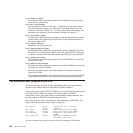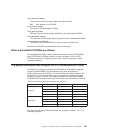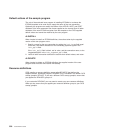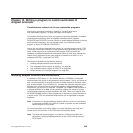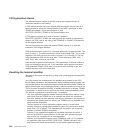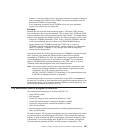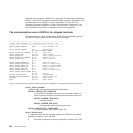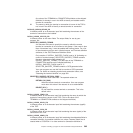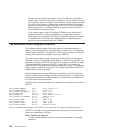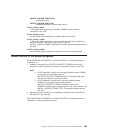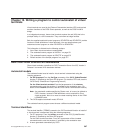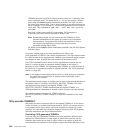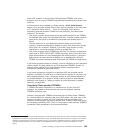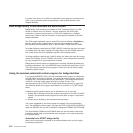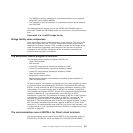
installed, and stored within the definition. Thus, if the definition is shipped to
another region, the value of the token is shipped too. The correlation ID is used
by CICS during attach processing, to check whether existing shipped definitions
in an AOR are up-to-date, or whether they need to be deleted and reshipped
because the terminal has been re-installed in the TOR. For further information
about instance tokens, see Efficient deletion of shipped terminal definitions, in
the CICS Intercommunication Guide.
If your control program maps TOR-allocated TERMIDs to the aliases that it
assigns in the AOR, by recording correlation IDs it could check whether a
terminal has been re-installed in the TOR. If the terminal has been re-installed,
it is possible that the TOR-allocated TERMID relates to a different physical
device from that last installed under this TERMID.
The autoinstall control program at DELETE
The autoinstall control program is reinvoked when an autoinstalled resource is
deleted. (The resources that can be autoinstalled are listed under “The autoinstall
control program at INSTALL” on page 561.) Invoking the user program at DELETE
enables you to reverse the processes carried out at INSTALL.
The parameter list passed to your user program at DELETE of local terminals is
described on page “The autoinstall control program at DELETE” on page 525. The
parameter list passed at DELETE of local APPC connections is described on page
“The autoinstall control program at DELETE” on page 549. The parameter list
passed at DELETE of Client virtual terminals is described on page “The autoinstall
control program at DELETE” on page 575. This section describes only DELETE of
shipped terminals and connections.
Shipped terminal and connection definitions are deleted by the CICS Transaction
Server for z/OS, Version 3 Release 2 timeout delete mechanism. For details of the
timeout delete mechanism, see Efficient deletion of shipped terminal definitions, in
the CICS Intercommunication Guide.
Figure 52 shows the communications area passed to the autoinstall user program at
DELETE.
At DELETE, all fields in the communications area are input only. Fields not listed
below are as described for INSTALL.
DELETE_SHIPPED_EXIT_FUNCTION
A 1-byte field that indicates the type of resource being deleted. The equated
values are:
DELETE_SHIPPED_COMMAREA DSECT , Delete parameter list
DELETE_SHIPPED_STANDARD DS F Standard field
DELETE_SHIPPED_EXIT_FUNCTION DS XL1 Delete type
DELETE_SHIPPED_TERM EQU X’FA’ Delete terminal
DELETE_SHIPPED_RSE EQU X’FB’ Delete remote system entry
DELETE_SHIPPED_EXIT_COMPONENT DS CL2 Component ID ’ZC’
DS CL1 Reserved
DELETE_SHIPPED_TERMID DS CL4 TERMID in TOR
DELETE_SHIPPED_APPLID DS CL8 Applid of TOR
DELETE_SHIPPED_LTERMID DS CL4 TERMID in AOR
DELETE_SHIPPED_NETNAME DS CL8 Netname of terminal
Figure 52. Autoinstall control program’s communications area at DELETE. For shipped terminals and connections.
564 Customization Guide



